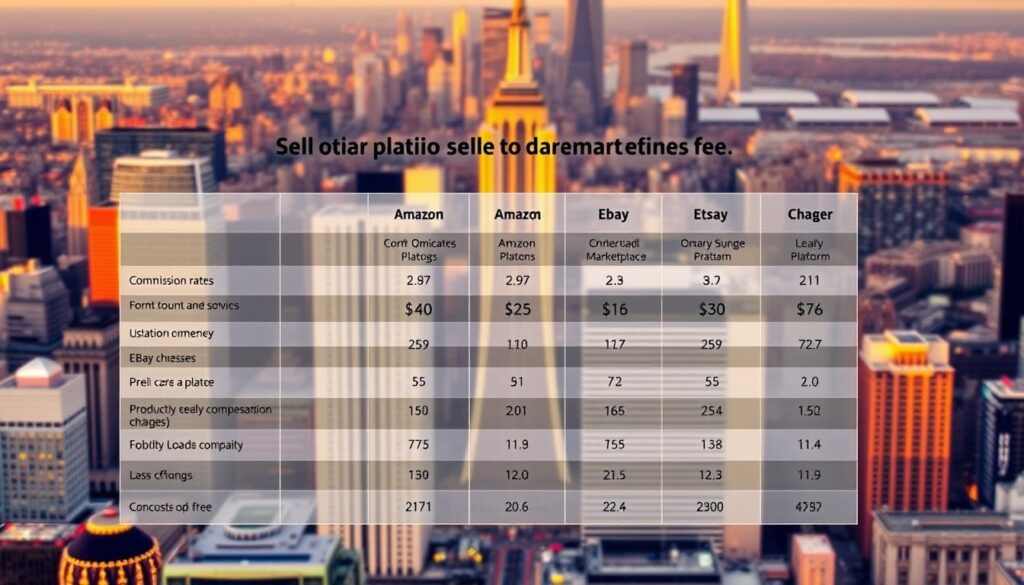When you’re starting an online shop, you have to decide between two big choices. You can sell on a marketplace or have your own standalone store. This choice affects your brand, how you connect with customers, and your profits.
Choosing the right place to sell online is key to success. You need to think about the good and bad of each choice. Things like how many customers you can reach, how much control you have over your brand, and the costs of running your shop are important.
Table of Contents
Key Takeaways
- Choosing between a marketplace and a standalone store is a key decision for your online business.
- Each option has its benefits and drawbacks that can affect your brand and profits.
- Understanding the pros and cons is key to making a smart choice.
- The right e-commerce platform can greatly help your business succeed.
- It’s important to consider customer reach, brand control, and costs carefully.
The Current UK E-commerce Landscape
The UK’s e-commerce scene is changing fast. This is due to new consumer habits and tech progress. For business owners, knowing these changes is key to a good e-commerce plan.
Key UK Online Shopping Trends in 2023
In 2023, UK online shopping trends show a big move to mobile. More people are using their phones to shop online. There’s also a big push for eco-friendly products and packaging.
- Mobile commerce keeps growing, with phones leading online shopping.
- People want to buy things that are good for the planet.
- Personalized shopping experiences are now a must.
Post-Brexit and COVID-19 Market Changes
Both Brexit and COVID-19 have changed the UK’s e-commerce world a lot. After Brexit, businesses had to deal with new trade rules and tariffs. The pandemic made online shopping even more popular, pushing businesses to improve their online shops fast.
The pandemic showed how important a strong online presence is. People turned to online shopping for safety and ease. So, businesses had to invest in digital tools and change their logistics to meet these new needs.
- Brexit brought new trade and logistics challenges.
- The pandemic made online shopping much more common.
- Businesses had to quickly adjust to new shopping habits and expectations.
By grasping these trends and changes, you can make your business thrive in today’s UK e-commerce world.
Understanding Marketplace vs Standalone Store UK Options
In the UK’s changing e-commerce world, it’s key to know the difference between multi-vendor marketplaces and standalone stores. This knowledge helps you choose the best path for your online business.
What is an Online Marketplace?
Online marketplaces are digital spaces where many sellers offer different products. Sites like Amazon UK, eBay UK, and Etsy UK are examples. Here, sellers use the platform’s customer base and setup to sell their items.
These platforms attract a lot of customers and handle logistics, making it simpler to start selling online. But, they also have their own rules, fees, and competition.
What is a Standalone E-commerce Store?
A standalone e-commerce store is a unique online shop run by one business. It gives full control over branding, customer experience, and sales plans.
Platforms like Shopify and WooCommerce let businesses create their own e-commerce sites. They offer flexibility and the chance to customize.
Key Differences at a Glance
| Feature | Online Marketplace | Standalone E-commerce Store |
|---|---|---|
| Control Over Branding | Limited | Complete |
| Initial Investment | Lower | Higher |
| Customer Base | Existing | To be built |
| Logistics and Shipping | Often handled by the platform | Managed by the seller |
The choice between a marketplace and a standalone store depends on your business goals, resources, and what you want to achieve.
“The right e-commerce strategy can significantly boost your business’s online presence and profitability.”
Popular UK Marketplaces: An Overview
Exploring the UK’s online selling options is key for your business strategy. The UK e-commerce sector is competitive. Many marketplaces offer benefits and opportunities for businesses.
Amazon UK: Fees, Requirements and Audience
Amazon UK is a top marketplace, attracting millions. To sell here, you must consider fees. These include selling plan, referral, and fulfillment fees if using Amazon’s services.
Amazon’s huge customer base and trusted brand are big pluses. But, you need to optimize listings and manage inventory well to thrive.
eBay UK: Seller Structure and Benefits
eBay UK focuses on auctions and fixed-price listings. Fees include listing, final value, and optional service fees. eBay’s flexibility lets sellers list a wide range of products.
Understanding eBay’s seller structures is vital for boosting sales. This includes knowing the different seller account types.
Etsy UK: Niche Market Opportunities
Etsy UK is for handmade, vintage, and unique items. It’s perfect for sellers of bespoke and craft products. Fees include listing, transaction, and payment processing fees.
To succeed on Etsy, focus on high-quality listings. Use good images and detailed descriptions. Engage with the community to build your brand.
Other Notable UK Marketplaces
Other UK marketplaces worth exploring include Rakuten and Allegro. MusicMagpie is great for second-hand music, movies, and games. Each has its own audience and selling opportunities.
Knowing the UK marketplaces can boost your e-commerce strategy. By choosing the right ones, you can use their advantages to grow your business.
Leading Standalone E-commerce Platforms for UK Businesses
UK businesses looking to grow online can explore many e-commerce platforms. These platforms let you customize your store’s look, features, and user experience.
Shopify: UK Pricing and Features
Shopify is a top choice in the UK for its easy-to-use interface and wide range of e-commerce tools. It has different plans, starting at £25 a month, fitting various business sizes. Shopify offers payment gateways, inventory management, and themes you can change.
WooCommerce: Flexibility for UK Sellers
WooCommerce is great for WordPress users in the UK. It offers lots of flexibility and customization, so sellers can make their stores unique. It’s free to download, but you might need to pay for themes, plugins, and payment gateways.
Magento: Enterprise-Level Solutions
Magento is for big businesses and those with complex needs. It has advanced features like managing multiple stores, lots of customization, and strong security. Magento grows with your business, making it perfect for those planning to expand.
UK-Based E-commerce Solutions
There are also UK-focused e-commerce solutions. These platforms offer support and features tailored for the UK market. For more on e-commerce platforms for startups, check out https://blogking.uk/best-e-commerce-platforms-for-startups-in-2025/.
When picking an e-commerce platform, think about price, features, how it scales, and customer support. Here’s a comparison of the platforms mentioned:
| Platform | Pricing | Key Features | Scalability |
|---|---|---|---|
| Shopify | £25-£299/month | Integrated payments, inventory management, customizable themes | High |
| WooCommerce | Free (additional costs for themes/plugins) | Flexibility, customization, WordPress integration | Medium to High |
| Magento | Custom pricing for enterprise solutions | Multi-store management, advanced customization, robust security | Very High |
Understanding each platform’s strengths and weaknesses helps UK businesses choose the best one. This choice can improve their online presence and customer experience.
Advantages of Selling on Marketplaces
UK businesses can benefit a lot from selling on online marketplaces. These platforms have a big customer base and make things easier for you. This helps you grow your online shop.
Built-in Customer Base and Traffic
One big plus of selling on marketplaces is getting to a huge customer base right away. Sites like Amazon UK, eBay UK, and Etsy UK are trusted by many. This brings lots of visitors to their sites.
With these customers already there, you can start selling without spending a lot on marketing. For example, Amazon UK got over 300 million visits in 2023. This is a huge chance for your products to reach more people.
Lower Initial Investment Requirements
Starting to sell on marketplaces costs less than setting up your own online shop. You don’t have to spend a lot on website building, marketing, and shipping. The marketplace already has these things set up.
Let’s look at how much you might need to start:
| E-commerce Option | Initial Investment | Ongoing Costs |
|---|---|---|
| Marketplace Selling | Low (listing fees) | Variable (selling fees, shipping) |
| Standalone Store | High (website development, marketing) | High (maintenance, marketing, logistics) |
Simplified Operations and Logistics
Marketplaces make running your online shop easier. They help with things like managing stock, handling orders, and dealing with customers. This lets you focus on finding products and selling them.
For instance, Amazon’s FBA service takes care of storing, packing, and sending out orders. This makes your logistics simpler and ensures fast delivery to customers.
Disadvantages of Marketplace Selling
Selling on marketplaces has its downsides. UK businesses should know these before expanding online. It’s key to grasp the challenges of selling on marketplaces.
UK Marketplace Fee Structures
Selling online comes with costs. Sellers pay commission fees, which vary by platform. For example, Amazon UK charges a percentage of sales, plus extra fees for services.
“Fees can cut into your profits,” an e-commerce expert warns. “UK businesses must consider these costs when setting prices to stay competitive.”
Limited Brand Control and Identity
Marketplaces limit brand control. It’s hard to stand out and keep a consistent brand image. You might struggle to show your brand’s unique value.
To improve, focus on quality listings and use brand customization options. Yet, marketplace selling’s limits can hinder building a strong brand.
Competition and Visibility Challenges
Marketplaces are crowded, making it hard to be seen. New or small businesses face intense competition. It’s tough to get noticed on platforms like eBay UK or Etsy UK.
To stand out, use relevant keywords like “uk online shopping trends” in your listings. Also, consider using marketplace ads to boost visibility.
In summary, marketplaces have benefits but also drawbacks. Fees, limited brand control, and competition are key challenges. Understanding these can help you make better e-commerce choices and explore other sales channels.
Benefits of Operating a Standalone Store
For UK retailers, having an independent online store can be a game-changer. It gives you control over your brand and how you engage with customers. Running a standalone store has many advantages that can boost your business’s success.
Complete Brand Control and Customisation
You can create a unique brand identity and shopping experience with a standalone store. You can personalise everything, from the website design to the checkout process. This ensures your brand values and target audience are well matched.
Direct Customer Relationships and Data
Having a standalone store lets you build direct relationships with customers. You can collect valuable customer data. This data helps you create targeted marketing campaigns and improve customer retention.
Studies show businesses that use customer data well see a big jump in customer loyalty. You can learn more about using customer data in this article on customer value.
Freedom from Marketplace Restrictions
Standalone stores aren’t limited by marketplace rules. You can set your own prices, run promotions, and create loyalty programs. You don’t have to follow a marketplace’s guidelines.
| Feature | Standalone Store | Marketplace |
|---|---|---|
| Brand Control | Complete control over branding | Limited control, follows marketplace guidelines |
| Customer Data | Direct access to customer data | Limited access to customer data |
| Flexibility | Flexible pricing and promotions | Restricted by marketplace policies |
Choosing a standalone store can bring many benefits to UK businesses. It can lead to more customer loyalty and higher revenue.
Challenges of Running a Standalone Store
Running a standalone e-commerce store in the UK comes with its own set of challenges. You get to control your brand fully and connect directly with customers. But, it demands a lot of money for marketing, tech, and building trust.
UK Marketing and Traffic Generation
Getting enough visitors is a big hurdle for standalone stores. Unlike marketplaces, they don’t get traffic from existing customers. You must spend on good marketing to draw in people.
Effective marketing for UK businesses includes:
- Search Engine Optimisation (SEO) to show up on search engines
- Social media marketing to connect with your audience
- Email marketing to keep customers coming back
- Influencer partnerships to reach more people
Technical Requirements and Maintenance
Handling the tech side of a standalone store is tough. You must make sure your site is easy to use, safe, and works on all devices.
Technical needs are:
- Keeping software up to date and secure
- Designing your site to work well on phones
- Connecting with payment and shipping services
- Checking and improving your site’s performance
Building Trust with British Consumers
Winning over customers’ trust is key for your store’s success. British shoppers are careful online, and you must prove you’re reliable.
Ways to gain trust include:
- Showing customer feedback and reviews
- Using strong security, like SSL certificates
- Being clear about products, prices, and shipping
- Providing top-notch customer service
By tackling these challenges, UK businesses can thrive in the e-commerce world.
Hybrid Approach: Combining Marketplaces and Standalone Stores
UK businesses are now using a mix of marketplaces and standalone e-commerce stores. This way, they can sell more and reach more people. It makes them stronger in the UK’s competitive online market.
Strategic Integration of Both Channels
Combining marketplaces and standalone stores needs careful planning. Businesses must think about what they sell, who they sell to, and how they operate. Selling on different platforms helps avoid relying on just one.
For example, a business might use its own store to build its brand and keep customers coming back. At the same time, it can sell on Amazon UK to reach more people. This can boost sales and make the brand more visible.
Inventory and Order Management
Managing stock and orders well is key for a hybrid e-commerce plan. Businesses must keep their stock levels the same everywhere to avoid selling out or having too much stock.
Using a system that manages stock across all platforms can help. It can make operations smoother, cut costs, and make customers happier. This might involve using platforms that let you sell on multiple channels and linking them to stock management software.
- Centralise inventory management to avoid discrepancies.
- Automate order fulfilment across different sales channels.
- Monitor sales performance in real-time to make informed decisions.
UK Success Stories of Multi-Channel Selling
Many UK businesses have done well by using a hybrid e-commerce strategy. For instance, some have seen big jumps in sales and customer interest by mixing their own stores with selling on marketplaces.
| Business | Strategy | Outcome |
|---|---|---|
| Business A | Combined standalone store with Amazon UK | 30% increase in sales |
| Business B | Integrated eBay UK with their WooCommerce store | 25% increase in customer engagement |
These stories show the benefits of a hybrid approach for UK businesses. They can see more sales, better brand visibility, and more customer interaction.
How to Choose the Right Option for Your UK Business
As a UK business owner, it’s key to know the difference between selling on a marketplace and running your own store. Your choice depends on your business type, resources, technical skills, and growth plans.
Assessing Your Business Type and Resources
Think about the products you sell. Unique or high-end items might do better in your own store. This way, you can highlight their features and build your brand. On the other hand, common products might be better on a marketplace where prices are competitive.
- Product type and complexity
- Target audience and their preferred shopping channels
- Available financial resources for initial investment and ongoing fees
- Logistical capabilities, including inventory management and shipping
Understanding these points will help you decide between a marketplace’s customer base and your own store’s brand control.
Considering Your Technical Capabilities
Your technical skills are important when choosing between a marketplace and your own store. Marketplaces are easier to use and handle many technical tasks for you.
But, running your own store needs more technical know-how, like with WooCommerce or Magento. You’ll need to think about:
- The cost of developing and maintaining your e-commerce site
- Integration with payment gateways and shipping providers
- Security measures to protect customer data
- Scalability to handle increased traffic and sales
Aligning with Your Long-Term Growth Strategy
Your choice should match your growth plans. If you want to build a strong brand and connect directly with customers, your own store is better. For quick growth with less upfront cost, a marketplace might be right.
When planning for growth, consider these points:
| Growth Factor | Marketplace | Standalone Store |
|---|---|---|
| Brand Control | Limited | Complete |
| Customer Data | Limited Access | Full Ownership |
| Initial Investment | Lower | Higher |
By carefully looking at these factors, you can make a choice that supports your UK business’s online success.
Conclusion
In the fast-changing UK e-commerce world, knowing the difference between a marketplace and a standalone store is key. This choice depends on what your online shop needs to succeed. It’s all about what’s best for your business.
Think about your resources, technical skills, and future plans when deciding. You might even consider a mix of both, blending the strengths of marketplaces and standalone stores. This way, you can make your online shop stand out and boost sales in the UK.
Whether you pick a marketplace like Amazon UK or eBay UK, or go for a standalone store with Shopify or WooCommerce, it’s important to match your e-commerce plan with your business goals. This ensures you connect well with your customers, helping your UK business grow and thrive.
FAQ
What are the main differences between selling on a marketplace and operating a standalone store?
Selling on a marketplace means listing your products on sites like Amazon or eBay. Running a standalone store means you have your own website. Marketplaces have a ready customer base, while standalone stores let you control your brand and customer relationships.
What are the fees associated with selling on UK marketplaces like Amazon and eBay?
Amazon UK charges a selling plan fee, referral fee, and shipping fee. eBay UK charges an insertion fee, final value fee, and PayPal fees. These fees depend on your product’s category, price, and shipping. Knowing these fees helps you figure out your profit margins.
How do I choose between a marketplace and a standalone store for my UK business?
Think about your business type, resources, and growth plans. If you’re small or have limited resources, a marketplace might be better. For a bigger brand wanting more control, a standalone store is more suitable.
Can I use both marketplaces and standalone stores for my UK business?
Yes, many UK businesses sell on both marketplaces and have their own stores. This way, you can reach more people and keep control over your brand.
What are the technical requirements for running a standalone e-commerce store in the UK?
You’ll need to pick an e-commerce platform like Shopify or WooCommerce. Consider payment gateways, shipping integrations, and security. You’ll also need to market your store to attract customers.
How do I manage inventory and orders across multiple sales channels?
Use inventory management software to keep your stock levels in sync. You can also link your platforms with order management systems to make fulfilling orders easier.
What are the benefits of having a standalone store for my UK business?
A standalone store gives you full control over your brand and customisation. You can build direct customer relationships and avoid marketplace restrictions. This helps you create a strong brand identity and keep customer loyalty.
How do I drive traffic to my standalone e-commerce store?
Use SEO, PPC, social media, and email marketing to attract visitors. You can also use your current customer base and encourage word-of-mouth to grow your store.











